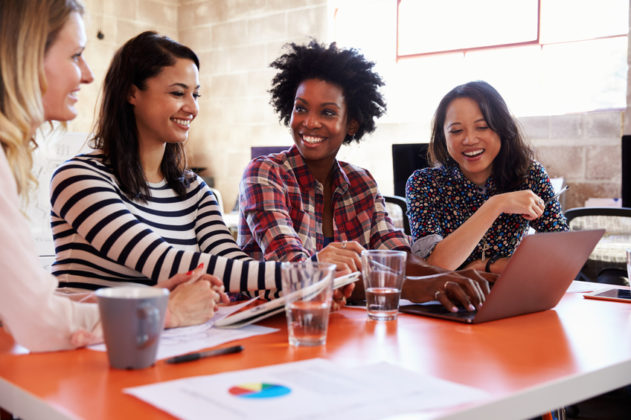We want to be with one another and have a sense of solidarity with those who share our experience.
I’ve spent many years in women’s communities and I, myself, create spaces for women to come and do their sexual growth work with one another. These spaces are incredibly important for our own well-being and evolution. They are part of any revolution.
I was recently teaching a women’s workshop in a “sex-positive” space that includes mixed gender events as a general rule. Their belief is that events should be open to all people regardless of gender or sexual identity. I had thoughtful conversations with some of the members who were grappling with what it meant to have an all-women’s event that excludes men when they are an open and “inclusive” space. Let’s be really clear: Affinity spaces—where informal learning takes place—are not the opposite of inclusive. Not everything needs to be inclusive and there are reasons why a community that values inclusivity might also make room for affinity work.
People who have similar experiences in the world need space together. We want to be with one another and have a sense of solidarity with those who share our experience. We need space to be honest about the things that might be harder to talk about in a mixed space. We need time and space to allow our guard down and have honest dialogue about issues that impact us, especially if we are a group with less power who enjoy fewer privileges in the world.
When people complain about affinity groups (which are groups of people linked by a common interest), it’s almost always because they are part of a more privileged group who feel they are entitled to be everywhere, like cats who detest closed doors, or like a child who inserts themselves in the middle of their parents’ kiss, afraid to miss out or be left out. Not every space is your space and there are good reasons for that. It’s OK. I don’t need to be everywhere and you don’t either.
People need space and time to talk about things that concern them. Those issues may have nothing to do with you. Trust that productive things are happening and that it’s healing for people to have their own spaces.
I’ve been in many women’s communities where there are designated spaces for women of color. I have never questioned their need for that space, away from white women, like myself, who have a different experience in this racist world. Men often need space to talk about the issues that plague them as well, without women or others coming in and shifting conversations about masculinity or male gender roles. It is beneficial for men to have that.
As a queer person, having queer spaces is important to me. It was very important to those people who were celebrating together at Pulse in Orlando. We need to have our own spaces outside of the heterosexist dominant culture that assumes everyone to be heterosexual until shown otherwise, away from the homophobia that we live with all the time. Many LGBTQI spaces and neighborhoods get gentrified quickly and we lose the spaces we gravitate toward.Sometimes there is a natural and respectful flow, and sometimes it feels like heterosexuals coming in and taking over.
Many people do not feel a need for affinity spaces, but whether it’s a “night with the guys,” a “girl’s night out,” a children’s camp, a group for parents of children with disabilities, a conference affinity group, or a more specific community event where space is needed and made for members of a group to connect, many of us do need it and want it. Sometimes terrific work is done in those spaces and the best thing we can all do is support others to have those spaces where they can feel supported and forge important relationships with others who have a shared experience.
I will always be grateful for the women’s and LGBTQI spaces I’ve been a part of. They fortify me to come back into the larger culture and have the hard conversations, to raise my voice for justice and to help the people I am here to help. I will continue to create spaces for women to do their work away from the sexist soup we all live in daily, because that work is desperately needed. That doesn’t mean I don’t support men or trans people of varying identities. It doesn’t mean I don’t believe in creating inclusive spaces as well. I teach many mixed gender classes and provide other kinds of opportunities for all kinds of people. I will respect the spaces that were not built for me. And I know women need space to heal the sexual issues, gender-based shames and violence that we have experienced and to celebrate what we are working toward, and I will wholeheartedly be a keeper of that space for all women as long as it is needed.
As a Sexual Empowerment expert and thought leader, Amy Jo Goddard has guided thousands of people toward the wholeness and fulfillment they want, sexually and in other aspects of their lives. She creates unique opportunities for women and couples to deeply explore, heal, and grow their sexuality. She is also a corporate consultant, helping companies elevate the professional and personal lives of women. You can find her online, writing about practical, real-world sexuality and evolved relationships at www.amyjogoddard.com.
This originally appeared on AmyJoGoddard.com. Republished here with permission.
Other Links:

